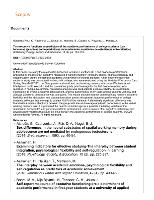Resumen
In this paper, we study the relationship between Executive Functions (EF) and academic performance, analyzing by means of EF cognitive measures if working memory, inhibitory control, cognitive flexibility and categorization predict the general academic achievement of college students. A non-experimental cross-sectional study was conducted involving 104 college, who were evaluated using the Modified Wisconsisn Card Sorting Test (M-WCST), the Stroop color and word test, and working memory index from Wechsler Adult Intelligence Scale WAIS-III; and the cumulative grade point average for the last academic period was recorded. A multiple hierarchical regression analysis was conducted to evaluate whether EFs contribute significantly to overall academic achievement, and the performance of EF tasks among students with low and average academic performance was compared. The results showed that the verbal working memory, cognitive flexibility and the abstraction and concept formation predict the general academic performance of college students, although they manage to explain 19,8% of the variance. A statistically significant difference was found with a median effect size between the group with low and average academic performance in the verbal working memory task. It is proposed the need to consider age as a possible mediating variable of the relationship between EF and general academic performance, and to explore other cognitive, behavioral and psychosocial variables that could be influencing in the academic performance of college students














